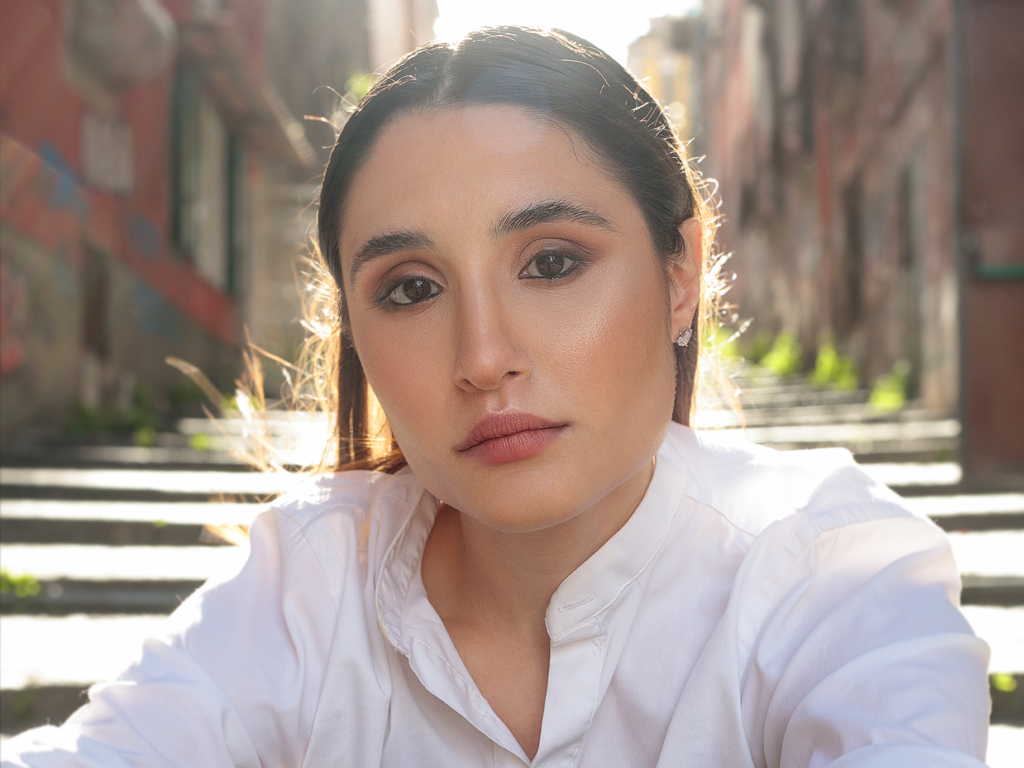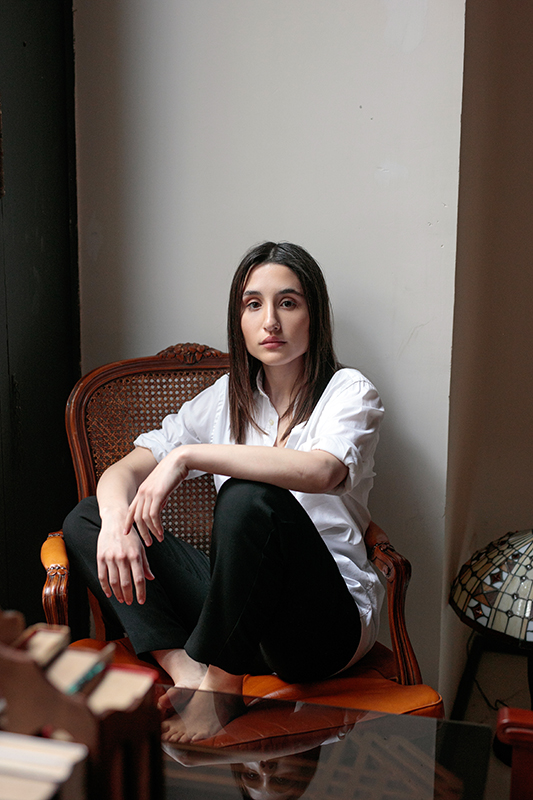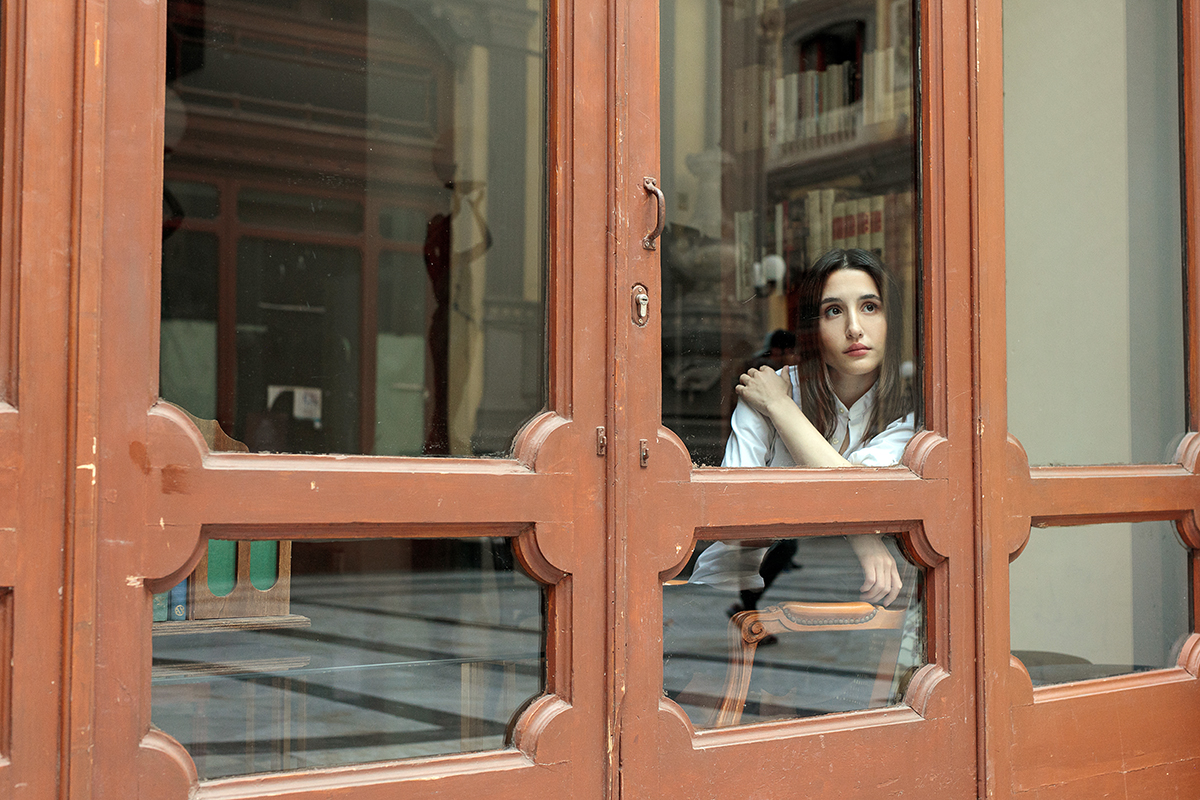
Marianna Fontana
Determinata, studiosa, eclettica. Protagonista del film di Mario Martone “Capri-Revolution”, poi il teatro, una serie tv e ancora tanto cinema. Dell’isola che l’ha lanciata dice: “devo molto all’energia di Capri”
Intervista di Claudia Catalli
foto di Pepe Russo • Makeup Mariangela Salvati
Ha mosso i primi passi con Edoardo De Angelis e sua sorella gemella Angela nel film Indivisibili, ma è con Mario Martone e il suo Capri-Revolution che ha preso il largo, dimostrando di poter reggere sulle spalle il peso e lo spessore di un ruolo da protagonista. Da allora la talentuosa Marianna Fontana, 26 anni, seleziona attentamente tutte le proposte che le arrivano perché, ci confida, se un personaggio non le trasmette la giusta magia non riesce a fingere o a forzarsi. La genuinità è la sua forza, riesce a trasmetterla anche ai suoi personaggi, che profumano di vero anche quando si tratta della vestale guerriera Ilia che parla protolatino nella serie Romulus su Sky e Now. Determinata, studiosa, con una voce pazzesca ma con la vocazione alla recitazione più che al canto, Marianna si apre in un sorriso quando parla della sua terra e ricorda per noi la sua prima volta a Capri, l’isola che l’ha lanciata, cullandola nelle riprese del suo primo film da protagonista e donandole una sorprendente energia: anche per questo, ogni volta che ci torna, prova sempre un senso di gratitudine.
Ci racconta la sua prima volta a Capri?
«Ero con la mia famiglia per una giornata di vacanza. Avrò avuto dieci anni, ricordo la piacevolezza di un giorno libero in un posto meraviglioso. Io poi con il mare ho un rapporto intenso, quando non lo vedo per un po’ mi manca. A volte mi ci fermo davanti in adorazione, mi dà forza, serenità, armonia».
A Capri è poi tornata per lavoro, con Mario Martone, per il suo film “Capri-Revolution”.
«In quell’occasione ho scoperto una nuova Capri. La sua energia mi ha aiutato molto. Essendo un film tutto ambientato sull’isola, sentivo di doverla conoscere a fondo e mentre ero lì percepivo il respiro della terra, selvaggia, femminile. Perché Capri è molto femminile e questo mi ha aiutato a costruire il mio personaggio, una ragazza ribelle, decisa ad emanciparsi».
Com’è stato trascorrerci intere settimane?
«Era il periodo tra la fine di agosto e l’inizio di settembre, splendido e non molto affollato. Con la seggiovia sono salita sul Monte Solaro, il punto più alto, da cui si vede tutta l’isola e il Golfo di Napoli. Poi ho passeggiato per le vie più antiche di Anacapri e ne sono rimasta incantata. Vi sono tornata recentemente per il matrimonio di un caro amico e l’isola rinnova il suo fascino ogni volta».
Perché “Capri-Revolution” è stato una svolta?
«Avevo 21 anni, era il mio primo film importante “da sola”, dopo Indivisibili. Avevo paura, mi chiedevo se sarei riuscita a farcela, a reggere un ruolo così forte con un regista del calibro di Martone. È lì che ho capito che volevo fare questo mestiere, possibilmente per sempre».
Lottare contro tutti e tutto per essere libera è qualcosa che la contraddistingue anche nella vita reale?
«Fa parte della mia indole, ma lo cerco anche nei personaggi. Sarà che vengo da un piccolo paesino, Maddaloni, dove non c’è un cinema, non ci sono teatri. Mi porto dietro da allora la voglia di uscire da un posto che mi ha comunque regalato una bella infanzia, ma anche la fame di conoscere, allargare i confini, emanciparmi».
Dopo “Capri-Revolution” è arrivato lo spettacolo “La cupa” a teatro. Com’è andata?
«Avevo seguito un seminario con Mimmo Borrelli, mi sono preparata il ruolo da cieca provando e riprovando a casa, con le bende agli occhi. Sul palcoscenico ho scoperto una nuova magia, il pubblico napoletano è caloroso e accogliente. Siamo andati in scena al San Ferdinando, il teatro di Eduardo De Filippo. Mi metteva i brividi solo il pensiero».
Che cosa ha il pubblico napoletano di diverso da tutti gli altri?
«A Napoli c’è un fermento culturale raro, appena posso ci vado per godermi gli spettacoli. Parlo di una cultura straripante di umanità e di cuore. In questa città si sente l’arte ovunque, nei vicoli, tra la gente, nei ristoranti. La cultura napoletana ha un’importanza mondiale: pensiamo ai fratelli De Filippo e alla mitica Titina, a Totò, a Sophia Loren e tanti altri. Penso a Teresa Saponangelo, che considero un esempio da seguire».
Dopo “Capri-Revolution” ha infilato un progetto più interessante dell’altro. Com’è la sua vita da attrice?
«La verità? Fatico ancora a pensarmi attrice, per me recitare è più un atto di fede, perché faccio rivivere una persona. Mi è capitato di rifiutare diversi progetti. Voglio sentire la magia e se non mi convincono i personaggi che mi propongono li evito. Ho ricevuto anche tante porte chiuse in faccia, non è tutto rose e fiori. Nel frattempo sto studiando al Dams a Roma, dove vivo con mia sorella. Mentre mio fratello, di tre anni più grande di noi, è un appassionato di cinema e si sta dedicando alla regia».
Questo amore per il cinema in famiglia da dove è nato?
«Mia madre da sempre ci ha educati all’amore per l’arte, dalla musica al cinema. Mia zia cantava, a livello amatoriale, ma con una voce bellissima. Ci hanno stimolato continuamente e noi avevamo il desiderio di voler fare qualcosa. Dobbiamo molto ad Edoardo De Angelis che ci ha scelte per il nostro primo film».
Come ci si divide, tra gemelle, dopo “Indivisibili”?
«Non è facile ritagliarsi l’individualità che permette a ognuna di poter fare autonomamente le sue cose. Per fortuna dopo Indivisibili lei ha lavorato con Marco Tullio Giordana e io con Mario Martone. Abbiamo scelto agenzie diverse, rifiutiamo progetti insieme e cerchiamo di trovare ognuna la propria strada. Per il resto passiamo molto tempo insieme con grande piacere, studiamo e viviamo nella stessa casa».
Vi siete mai sostituite nella vita?
«No, neanche agli esami. A me viene l’ansia solo al pensiero: ognuna ha il suo carattere, insistiamo molto nel dire “io sono io e tu sei tu”».
 Lei è un’attrice eclettica, fa cinema, teatro e serie tv. Penso a “Romulus”, tutta girata in protolatino, in cui inizia come vestale e finisce come guerriera.
Lei è un’attrice eclettica, fa cinema, teatro e serie tv. Penso a “Romulus”, tutta girata in protolatino, in cui inizia come vestale e finisce come guerriera.
«È stata una sfida continua: la lingua, la preparazione fisica, le scene d’azione. Avevo il terrore di non essere credibile. Venivo dal cinema d’autore, era tutto nuovo per me, soprattutto i ritmi. Dovevamo fare più scene al giorno, all’interno di una macchina produttiva enorme come quella che Matteo Rovere ha saputo mettere in piedi. E poi gli effetti speciali, i costumi, il trucco. È stato esaltante».
Quali sfide la attendono ora?
«Il film diretto da Claudio Bisio, L’ultima volta che siamo stati bambini, che sarà nelle sale in autunno e in cui interpreto una suora. È un film che intreccia il comico e il drammatico e per me è stata un’esperienza speciale, da un punto di vista sia personale che lavorativo. Ho scoperto un grande professionista e insieme una persona unica. E poi La seconda vita di Vito Palmieri, in cui invece sarò una ex detenuta. Un ruolo delicato e particolare che ha richiesto una preparazione lunga e molto tosta».
Da quali registi le piacerebbe essere diretta un domani?
«Per tornare in territorio campano direi Leonardo Di Costanzo e Pietro Marcello. Ma ho amato molto lavorare con Marco D’Amore, mi ha diretto in modo speciale in Napoli magica, ha una sensibilità unica».
Chiuda gli occhi: tra dieci anni come si vede?
«Laureata e spero ancora attrice in progetti che mi appassionino e con registi che mi facciano crescere sempre più».
Determined, hard-working, versatile. After starring in Mario Martone’s film “Capri-Revolution”, she went on to work in theatre, on a TV series and on other films. Talking about the island that launched her career she says: “I owe a lot to the energy of Capri.”
interview by Claudia Catalli
photos by Pepe Russo • Makeup Mariangela Salvati
She began her career with her twin sister Angela, working with Edoardo De Angelis in the film Indivisibili, but it was with Mario Martone and his Capri-Revolution that her career took off, demonstrating that she could handle all the depth and weight of a leading role. Since then the talented, 26-year-old Marianna Fontana has carefully selected her roles from the offers she receives because, she confides, if a character doesn’t transmit the right magic to her, she simply would not be able to fake or force it. Genuineness is her strength, and she succeeds in transmitting it to her characters, too, who always appear real, even in the case of the vestal priestess and warrior Ilia, who speaks an archaic form of Latin in the TV series Romulus on Sky and Now. Determined and hard-working, Marianna has an amazing voice, although she has more of a vocation for acting than singing. She breaks into a smile when she talks about the region she comes from and remembers the first time she went to Capri, the island that launched her career, nursing her through the shooting of her first film in a starring role, and giving her a surprising energy: that is another reason that she feels a sense of gratitude every time she comes back here.
Can you tell us about your first time on Capri?
“I was on a day trip with my family. I was ten years old, and I remember the pleasure of a free day in a marvellous location. And then I have a really intense rapport with the sea: when I don’t see it for a while, I miss it. Sometimes I stand in front of it with a kind of adoration: it gives me strength, serenity and harmony.”
Later on you came back to Capri to work with Mario Martone on his film “Capri-Revolution”.
“On that occasion I discovered a new Capri: its energy helped me a lot. Since the film is shot entirely on Capri, I felt I had to get to know the island inside out, and while I was there I could sense the land breathing, wild and female. Because Capri is strongly feminine and this helped me to construct my character: a rebellious young girl who is determined to emancipate herself.”
How did it feel to spend whole weeks here?
“It was between the end of August and the beginning of September, a glorious time when it isn’t too crowded. I went up Monte Solaro on the chair lift, the highest point on Capri, where you can see the whole of the island and the Gulf of Naples. Then I strolled through the oldest streets of Anacapri and I was utterly enchanted. I went back recently for the wedding of a great friend, and I find the island renews its allure every time I go.”
Why was “Capri-Revolution” such a turning point?
“I was 21 years old and it was my first important film “alone”, after Indivisibili. I was scared and wondered if I would be able to pull it off, to manage such a strong role with a director of the calibre of Martone. That was when I realised that I wanted to make this my career, perhaps for ever.”
So this fighting against everyone and everything to be free, is that something that also characterizes your own life?
“It’s in my nature, but I also look for it in my characters. Perhaps it’s because I grew up in a small village, Maddaloni, where there are no cinemas or theatres. Ever since then I have carried with me the desire to leave a place, even though it gave me a happy childhood: it also gave me an eagerness to find out about things, to broaden my horizons, to emancipate myself.”
After “Capri-Revolution”, you performed in a stage performance of “La cupa”. How did that go?
“I had attended a seminar with Mimmo Borrelli, and I prepared for my role as a blind girl by practising and practising at home, with a bandage over my eyes. On stage, I discovered a new magic, and the Naples audiences are really warm and welcoming. We performed it at Eduardo De Filippo’s theatre, San Ferdinando. Just the thought of it gave me the shivers.”
How are Naples audiences different from other audiences?
“There is a cultural buzz in Naples that is something quite rare: I go and see a stage play whenever I can. It’s a culture overflowing with humanity and heart. You feel art everywhere in Naples: in the streets, in the people, in the restaurants. Neapolitan culture has a global importance: take the De Filippo brothers, for example, and the legendary Titina, Totò, Sophia Loren, and many more. And then there’s Teresa Saponangelo, who I think of as a model to follow.”
After “Capri-Revolution” you’ve gone from one interesting project to another. How has your life as an actress been?
“Honestly? I still find it hard to think of myself as an actress; for me, acting is an act of faith more than anything, because I bring a person alive. I have sometimes turned down projects. I need to feel the magic and if I’m not convinced by the characters I’m offered, I avoid them. I’ve also had many doors shut in my face: life is not all a bed of roses. In the meantime, I’m studying at the Dams (School of Art, Music and Drama) in Rome, where I live with my sister. My brother, who’s three years older than us, is a film buff and wants to be a director.”
Where did this family passion for the cinema come from?
“My mother always brought us up to love all art, from music to the cinema. My aunt used to sing, at an amateur level but she had a lovely voice. They always encouraged us and we wanted to do something in that field. We owe a lot to Edoardo De Angelis who chose us for our first film.”
As twins, how do you separate yourselves, after “Indivisibili”?
“It isn’t easy for us to each carve out the individuality to be able to do things independently. Luckily, after Indivisibili my sister worked with Marco Tullio Giordana and I worked with Mario Martone. We chose different agencies, we turned down projects for us to work together and we each tried to make our own way. Apart from that, we spend a lot of time together very happily: we study together and live in the same house.”
Have you ever taken each other’s place in real life?
“No, not even for exams! The very thought of it makes me nervous: we each have our own personality, and we’re very insistent on saying: ‘I’m me and you’re you’.”
You’re a versatile actress: you work in films, theatre and TV series. I’m thinking of “Romulus”, which is shot entirely using an archaic form of Latin, where you start as a vestal priestess and end up as a warrior.
“It’s been a continual challenge: the language, the physical preparation, the action scenes. I was terrified that I wouldn’t be credible. I’d been working in art cinema, so it was all new for me, especially the pace. We had to make several scenes a day, as part of the huge production machine that Matteo Rovere succeeded in setting up. Then there were the special effects, the costumes, the make-up. It was exhilarating.”
What challenges are waiting for you now?
“A film directed by Claudio Bisio: L’ultima volta che siamo stati bambini, which will be in cinemas in the autumn. I play a nun. It’s a film that intertwines the comical and the dramatic and it was a special experience for me, both personally and from the work point of view. I discovered a great professional who is also a unique person. Then I’m going to be working on La seconda vita by Vito Palmieri, in which I play an ex-prisoner. It’s a delicate and unusual role that required a long and very tough period of preparation.”
Which directors would you like to work with in future?
“So as to return to Campania, I’d say Leonardo Di Costanzo and Pietro Marcello. But I loved working with Marco D’Amore; he directed me in a very special way in Napoli Magica: he has a unique sensibility.”
Close your eyes: how do you see yourself in ten years’ time?
“As a graduate and, I hope, still an actress, working on projects that I’m passionate about, with directors who make me grow more and more.”





